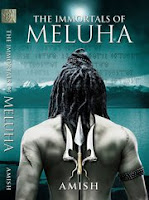Shiva Trilogy
My curiosity about Indian mythology was kick started after I read
the book Myth = Mithya by Devdutt Patnaik last year. This book provides an easy
to understand contemporary style understanding of the Indian mythology.
While I was reading Myth = Mithya, some of my friends were reading
a fiction on Lord Shiva, the Hindu God of destruction, written by Amish, an
alumnus of IIM Calcutta. Well, I resisted the temptation to read this book
because I was fully immersed in the rational arguments that Devdutt Patnaik had
given in his book and did not want to pollute my rationality with fiction.
However, I decided to read the book after my old roommate from MIT, Shashi,
recommended it.
With so many of my classmates having the book, it was not that
difficult to get hold of a copy. I started reading the first book of the three books
Shiva Trilogy, The Immortals of Mehula.
Well, having read the book I must say that it is a gripping story
and Amish churns out a whole new perspective. The story take on the real
mythological characters, such as Nandi and Sati, and brings out a gripping tale
of how Shiva, a Tibetan tribal, comes to the Kingdom of Mehula and becomes
the Neelkanth, the man with the blue throat, who according to the legends will
redefine the future of India.
Amish, the author, brings out a perspective that what if Shiva was
just a common man who rose to divinity because of his deeds and actions. This
argument is something that I also agree with and believe in. In fact it here
that the interpretation of Devdutt Patnaik guides me in understanding what is
the purpose and origin of mythology.
Continuing the story, the Neelkanth travels across the Kingdom of
Mehula and eventually leads the kingdom in a battle against the Chandrawanshis.
But does the Neelkanth's search for evil end with the battle or is it just a
beginning? But a bigger question looms in the Neelkanth's mind, what is evil,
what is good, who is right, who is wrong?
Some of these questions get answered to in the second book of the
trilogy, The Secrets of the Nagas.
In the second book Shiva, the Neelkanth, travels across the length
and breadth of the country and discovers new secrets, secrets that completely
change his understanding of what is evil? The second book ends with a very-very
interesting revelation. In fact the 2nd book has more twists and turns and
I am sure that the final book will bring an interesting end to this gripping the
story of Lord Shiva.
Well, if you have not read this book then I strongly recommend that you read it. Perhaps you will get a feeling similar to that you may have got when you read the Da Vinci Code.
My Ratings- ****1/2





Comments